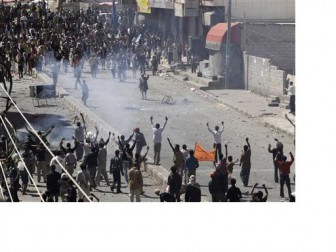SANAA/ADEN, (Reuters) – Four protesters were killed in clashes with police in southern Yemen yesterday as unrest spread and demonstrators called for an end to President Ali Abdullah Saleh’s three decades of rule. In a seventh straight day of protests inspired by revolts in Tunisia and Egypt, 3,000 marched in the southern port of Aden and police shot in the air to disperse the crowd.

Officials at two Aden hospitals told Reuters three men died of gunshot wounds after clashes with police.
A local official earlier reported another death by “random gunfire”.
He later said 17 others had been wounded in Aden by gunfire. “No to oppression, no to corruption, the people demand the fall of the regime,” chanted the Aden demonstrators, gathered to protest against the killing of two men on the previous day by stray bullets as police fired in the air. In Sanaa at least 40 were wounded as hundreds of Saleh loyalists, some armed with guns, charged around 1,500 protesters, who hurled rocks at them. Several journalists told Reuters they were beaten by loyalists, and the streets where clashes took place were stained with blood.
Late yesterday, small-scale clashes broke out between hundreds of protesters and Saleh supporters near Sanaa university, residents said. At least one man was hurt.
Amnesty International said in a statement: “Yemenis have a legitimate right to freedom of expression and assaults against both them and journalists covering their protests are totally unacceptable.”
Saleh, a U.S. ally against a resurgent wing of al Qaeda in Yemen that has launched attacks on foreign and regional targets, is struggling to quell month-old protests now erupting daily.“We won’t stop until this regime falls. We’ve been patient long enough,” said student Salah Abdullah in Sanaa.Around 3,000 people began their nightly rally in Taiz, where protesters have camped out in a central square for several days.
“Down with the regime, down with the oppressors,~ they shouted. No injuries were reported. Young people say they are angered by corruption and soaring unemployment. A third of the Arabian Peninsula state’s people face chronic hunger and 40 percent live on less than $2 a day.The government, whose authority is weak outside Sanaa, is struggling to cement a truce with northern Shi’ite rebels and suppress an increasingly violent southern separatist movement.
Trying to calm the streets, Saleh has made concessions such as a promise to step down when his term ends in 2013 and a vow not to let his son inherit power.





